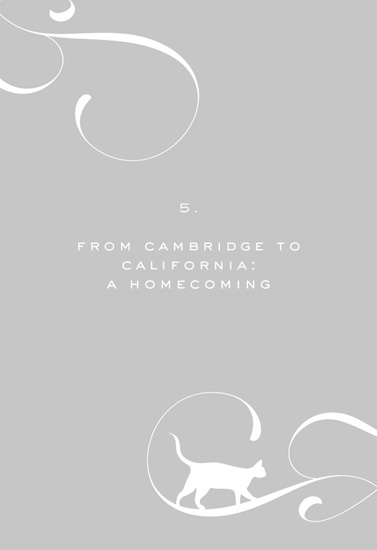
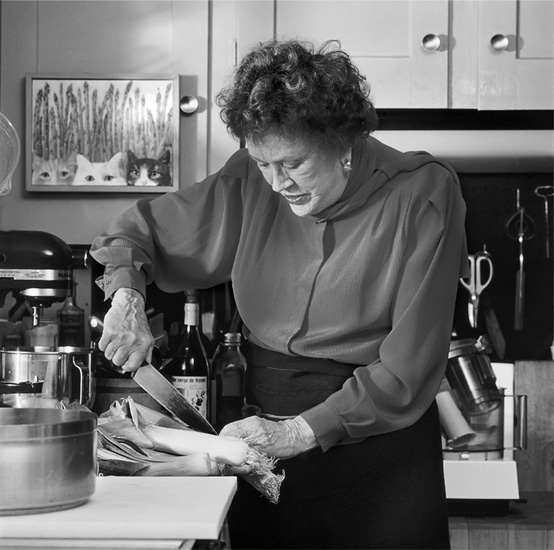
Julia and her kitchen Graces
A TRIO OF cats in a field of bright green asparagus peered out from a painting in Julia’s Cambridge kitchen. One friend thought they represented the Greek goddesses of Joy, Beauty, and Good Cheer, the three Graces whose dancing charms enlivened temple feasts. While Julia’s “Graces” couldn’t link paws and cavort around her kitchen, their bright-eyed gaze never failed to make her smile as she cooked a lovely meal for friends and served it with a jaunty “Bon appétit!”
The artist was Rosemary Manell, one of Julia’s dearest friends, who was equally nutty about cats. They met when their Foreign Service husbands took them to France, where they bonded over French cooking and champagne. Both were tall California girls who shared a taste for adventure and an earthy sense of humor. While Julia’s career in food blossomed, Rosie lived an artist’s life in California. But when Julia needed an all-around kitchen helper, Rosie was at her side, her indispensable right hand, bringing artistic flair to food design for her TV shows and books. The Cats with Asparagus painting may have been inspired by Blooper, Rosie’s gray chat de gouttière, who loved to eat asparagus, but only, she claimed, if it was perfectly cooked. A French foodie cat to the core.
Since a live-in cat was still out of the question for the globe-trotting Julia, she filled the house with faux felines. Kitty magnets clung to the refrigerator door, a neon-orange cat stared from a shopping bag, and pot holders in various feline poses collected near the stove. The Kliban cartoon cat crooning “Love to eat them mousies.…” shared wall space with a pensive photo by Paul of a silhouetted Minou. A sinuous glass cat reclined on a shelf, and Julia’s muse, the wooden marmalade cat she carted around to TV kitchens, leaned against the window, ready for duty.
It didn’t have far to travel. The rambling Colonial often doubled as a studio for photo shoots and TV shows, like the series In Julia’s Kitchen with Master Chefs. Now in her eighties, Julia liked to work at home. When she called, some of the biggest names in the culinary world showed up at her door, thrilled to be invited into the inner sanctum. Energized by cooking with new friends, Julia wasn’t ready to limit her role to host-observer, an “Alistair Cookie.” To the delight of her fans, she more than kept pace with chefs half her age.
If they expected to be wowed by acres of granite and high-end cooking gear, they were in for a surprise. Her kitchen was like Julia herself, unpretentious and welcoming. Shooting in the smallish room proved a challenge, but it was handy for Julia, who could go up to her room—not to nap, but to type book notes between takes.
Not far from the kitchen, the living room floor was a tangle of black cables tethered to hefty video cameras. Monitors and audio decks teetered on tables as a dozen staffers murmured into headsets, while Julia coordinated her assistants—literally sous chefs, down below in the basement prep kitchen. Her trusty aides performed with the precision of a drill team under the direction of their cheery drum major: “That looks just yummy, dearies!” From dawn till dusk, the kitchen elves prepared the recipes in stages, then sent them up to the kitchen “studio,” where Julia and her master chef du jour finished the lesson for the cameras.
Famous chefs weren’t the only ones vying to be invited into Julia’s kitchen—neighborhood cats were always trying to get into the act. On an unusually hectic production day, one of the furry Irving Street habitués, drawn by delectable smells but denied his customary access, paced furiously outside the kitchen window. The guest chef, Leah Chase, the “Queen of Creole Cooking,” was preparing Southern fried chicken that called for very hot oil and split-second timing. The director fretted about overtime and the cost of multiple takes, so each step had to be precisely choreographed, building to the climactic moment when chicken leg hits smoking oil.
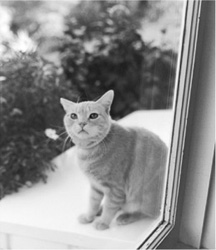
Ready for my close-up, Mrs. Child
The director finally barked, “Quiet on the set. Cameras rolling.” Then, with a broad smile into the camera’s red light, America’s beloved kitchen guru began her umpteenth show. “Hel-lo, I’m Joo-lya Child!” Everything was going according to plan, until she picked up a flour-dredged drumstick and dropped it into the bubbling oil. At that moment, the hungry cat pawing at the window let out such an ear-splitting yowl even the basement crew froze. Had there been a terrible accident? Boiling oil spilled? Fingers burned? Julia realized the wailing came from the outraged pussycat on the sill. Everything came to a halt until she got her gasping whoops under control, fished the soggy drumstick from the pot, and reheated the oil.
Take two: coat the chicken leg, shake off excess flour, and drop it into the smoking fat. On cue, the frantic cat did another take of his own, scratching at the windowpane and growling when the chicken hit the oil. “Cut!” Do it again. And again, until they were almost out of drumsticks.
Finally Julia saw that her team didn’t think the cat’s antics were as hilarious as she did. They were stymied—no one wanted to confront the testy, hungry feline. Julia came up with a surefire plan for relocating the demanding heckler. Send someone down the alley toting a steaming bucket of outtakes—extra-crispy, paw-lickin’ good, Southern fried, master chef carryout.
WHEN THE TV crews cleared out, life on Irving Street resumed a quieter pace. Friends were still in and out, and Julia’s nephew David stayed in the guest room during graduate school, keeping her company, especially at dinnertime. But with no Paul around to share a laugh and lift a postproduction flute of champagne, Julia’s housekeeper thought the place needed more than cat tchotchkes to liven things up. One day she arrived for work with a surprise tucked in her cleaning supplies.
The scene was eerily similar to that fateful day forty years earlier when Julia’s Parisian femme de ménage presented her with something she didn’t know she needed until she laid eyes on Minette. Julia plucked a buff-colored Persian kitten out of the bucket and beamed. Before she picked a name, she recalled Paul’s astute anatomy lesson. This poussiequette was definitely a Minou, not a Minette.
The rambunctious kitten loved to tear up and down the stairs and defy gravity, soaring from the newel post to the top of the bookcase. It wasn’t long before the little acrobat ran afoul of the burglar alarm. Julia tried her best to train Minou to pussyfoot around the sensors that would trigger an alert, but it was useless to reason with this highflier in the throes of a kitty-fit.
When the phone rang in the middle of the night, a groggy Julia had to reassure worried security guards she was in no danger. It was just an irrepressible kitten making his nocturnal rounds. After multiple midnight alarms, Julia reluctantly called her sister in California. Would Dort be a dear and adopt the lively kitten? He’s so much like that Roo de Loo rascal, Minette. The sisters reminisced about those long-ago French lessons punctuated by kitty love bites and telltale potatoes that turned up amid the lingerie. Dort, the lifelong animal lover, immediately said “Oui!” Minou felt right at home with someone who looked and sounded so much like Julia, but Julia sorely missed the fluffy troublemaker. When the sisters held their frequent gabfests, Julia always asked Dort to put her on speakerphone so Minou wouldn’t forget her.
In 2002, Julia moved to Santa Barbara for good and donated the Irving Street house to her alma mater, Smith College. A cadre of museum curators descended on the famous kitchen and meticulously documented everything in it, from the secondhand Garland range she bought for their first house in Georgetown for $429—a huge sum in 1956—to the marble mortar Paul lugged from the Paris flea market and the blue KitchenAid mixer hand-painted by Rosie Manell, plus every gizmo “Jackdaw Julie” had gathered over the years. They bubble-wrapped the cats that romped across her black refrigerator, the Cats with Asparagus painting, and the TV kitty mascot, and loaded the treasures into a moving van headed to the Smithsonian Institution in Washington, D.C., where it was all lovingly reassembled.
Before the exhibit opened to the public, Julia toured it with family and a few close friends. She was tickled by the detailed re-creation—everything exactly where it belonged, down to the last tea towel. In the flood of happy memories, her thoughts turned to her cheri. Leaning on a friend’s arm, she confided, “Oh, if only Paul could be here to see this. He would be so thrilled.”
As are the thousands of fans who make the pilgrimage to Julia’s kitchen each year. Gazing at the big wooden table and well-worn cookware, visitors yearn for the only thing that’s missing—Julia herself, filling the room with joyous exuberance. As they exit, visitors sometimes leave offerings—a champagne flute or stick of butter—or simply blow a kiss and whisper, “Bon appétit!”
EVEN IN HER late eighties, Julia’s idea of a perfect afternoon was speeding along in a red pickup truck on a winding country road she’d never been down before. Or waiting to board a plane, boat, or train that would take her to whatever was next. Amid the vineyards and sprawling country estates near Santa Barbara, NO TRESPASSING signs were meant for people with no imagination and PRIVATE PROPERTY postings surely only a suggestion. She egged on timid drivers to ignore keep-out signs and drive just a little faster. After all, she brightly reasoned, who wouldn’t be happy to see Julia Child coming up the drive?
She said she’d already clocked as many miles as an astronaut, but traveled much more lightly. Her suitcase held a skirt, a few pairs of slacks, some brightly patterned blouses, black Mary Janes with “straps to hold your feet in,” sneakers, a girdle, and makeup. The moment she snapped the case shut, she could and did go everywhere. Moving through an airport, she invariably attracted a flotilla of fans that swelled as it passed each gate. Everyone thought of her as a friend or favorite auntie and wanted to chat. Oblivious to the clock, she’d graciously pose for pictures. If she discovered a fellow cat lover, she would pull out her day planner and, like any proud grandmother, show off snapshots of her Minou, Minimouche, or le Petit Prince.
Julia never lost her yen for travel, and wherever she went, cats were bound to turn up—sometimes in unexpected places. For several years she was invited to teach a cooking class at the luxe Hotel Cipriani in Venice, a dazzling resort across from the Piazza San Marco, where water taxis plied the canals, ferrying guests from museums to restaurants to shops and back again. The French Chef could still attract a fervent following of well-heeled Americans just by doing what she loved the most—cooking good food and making it fun. Without Paul, her lifelong helpmate, she asked two dear friends from Cambridge, Pat and Herb Pratt, to go along and assist with the demonstrations.
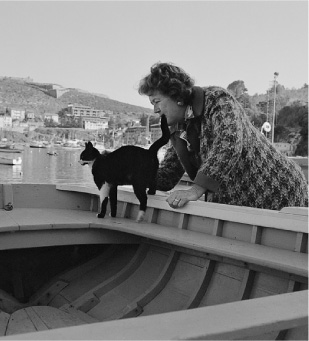
One night, strolling home across the bridge after a glorious dinner, Julia tripped and fell, but picked herself up and insisted on enjoying the rest of the evening. It soon became clear that her injuries, including a badly cut lip, needed medical attention, so the hotel staff helped Julia and her friends into a water taxi headed for the nearest pronto soccorso. By the time they arrived it was pitch dark and the fifteenth-century castello’s colonnades were dimly lit, but Julia was wide awake and typically curious.
She settled into a wheelchair for the ride through the silent courtyard to the far side of the hospital for X-rays. From the murky shadows, one, then two, then six cats peeped out from behind mossy columns and formed a disorganized but attentive escort. White-coated attendants seemed unfazed by cats wandering around a hospital, and though most Americans would be taken aback, Julia thought feline candy stripers were the perfect cheerer-uppers. The dottore offered no anesthesia before stitching her lip, but Julia didn’t mind. She stoically endured the procedure, entertained by the serenade of six gatto tenors pacing outside the treatment room.
On a visit to Paris, Julia and the Pratts attended an elegant dinner party in the Palais Bourbon, a fashionable neighborhood not far from the old Roo de Loo apartment. Ten guests were seated around a large round table, and when the hostess went to the kitchen to check on dessert, the family cat ambled into the room and leaped onto her chair. Looking around smartly and brightly, the pussycat seemed to follow the witty comments of the guests, as if about to contribute a bon meow or two to the conversation.
No one paid much attention to the cat ensconced at the head of the table, but Julia was elated by her new dining companion. When the hostess returned to reclaim her seat, the puss with savoir faire to spare relinquished his place and, with what appeared to be a feline Gallic shrug, settled on his corner ottoman.
For Julia the recipe for a perfect dinner party had just been greatly enhanced: fine food, plentiful wine, sparkling conversation, and a cat who came to dinner.

Julia meets a Venetian friend
“DO I LOOK retiring?” Julia bristled when reporters called her Montecito home a retirement community. Slowed by three back operations for a pinched nerve but still high-spirited, she learned to manipulate a walker and cane, and waited impatiently for visitors to whisk her away to wherever there were interesting people and something good to eat.
Heads turned when she cruised grocery aisles, squeezing, sniffing, and marveling over a new variety of lettuce or a perfect Comice pear she just had to bite into on the spot. Once word got out that Julia was in the house, a horde of shoppers would queue up at a respectful distance, robotically filling their carts with whatever she was buying.
She was a Saturday morning regular at the bustling farmers’ market in downtown Santa Barbara that reminded her of the cacophonous open-air stalls in Cannes. She beamed at the sight of so many zealous converts to the gospel of good eating, who hunted for the perfect artichoke and toe-mah-toes picked just hours ago. She stopped to chat with the orange man and the cucumber woman and nibbled nonstop. When she tasted a perfectly ripe strawberry, the surge of pleasure registered on her face as vividly as it did fifty years before when she trolled the markets of Paris.
Julia slung her bags of goodies over the handlebars of her walker and, when she tired, turned it around and plopped onto the makeshift stool to catch her breath. A few supplicants would approach and ask her to sign something. “How wonderful to see you!” “My kids eat green beans because you showed me how to cook them.” She basked in the attention.
On one trip her shopping companion bought a plastic pot of bright green shoots that Julia didn’t recognize. It turned out to be “kitty grass,” a digestive aid for her cat. Julia immediately wanted to know everything about this cat: How old, how big, how fluffy, how playful? Any pictures? She confided that she loved poussiequettes so much, she would have become a feline vet, if she hadn’t discovered French food first.
Julia’s ninetieth birthday prompted a string of glamorous galas, most of them fund-raisers for her favorite causes—anything to advance culinary education. Lavish dinners honoring the “Queen of Cuisine” were prepared by some of the country’s premier chefs, and included a $500-a-plate supper in the Napa Valley, an elegant French buffet at the Smithsonian, and a five-course, all-lobster dinner (except for dessert) in Boston. She relished them all, but her tastes now ran to less fancy fare. She still looked forward to lunching at fine restaurants, especially when the chef cooked up something she had a taste for, like a bowl of New England clam chowder. She was grateful when her chef friend Jim Dodge periodically filled the freezer with mini gourmet dinners she could defrost for guests. Friends were always happy to hear Julia’s voice on their answering machines with a cheery invitation to dinner and her signature sign-off, “Meow!”
Julia always saw herself as a serious home cook rather than a chef. When food talk got too precious, she mischievously called it “kweezeen.” She dismissed fad diets and the “food police” who would ban butter, cream, and red meat, spreading fear of food throughout the land. She adored Chinese food because it reminded her of those dinners in Kunming when she and Paul were falling in love, and she often had a hankering for braised ribs, peanut butter, and her “reverse martinis”—one part gin to seven parts vermouth. She raved about the hot dogs at Costco.
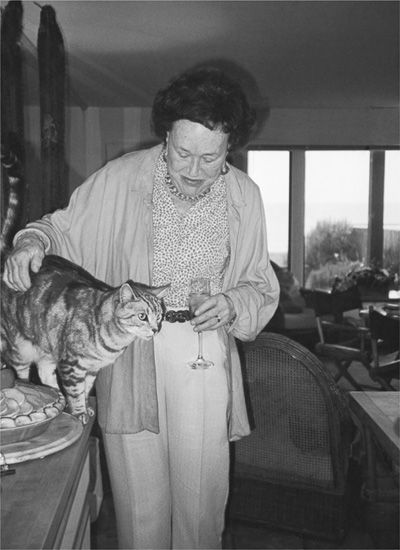
Extra brut, with just a whisker of catnip
Julia treated special out-of-towners to her personal tour of Santa Barbara. First stop, the In-N-Out Burger. One friend swore Julia knew every one between Santa Barbara and San Francisco, though she preferred the pommes frites at the Golden Arches. Julia and company got their burgers and fries to go and picnicked on the beach with a breathtaking view of the Pacific. After lunch the tour wound through the center of town, past the landmark hundred-year-old fig tree, and sometimes took a side trip to the zoo, to visit the Really Big Cats, of course.
Finally, the car stopped in front of the star attraction as Julia trilled brightly, “Now we’re all going to visit the Cat House,” an announcement that never failed to raise eyebrows. She led them toward a rambling old Victorian with an odd structure in the yard that housed a forest of cat trees, carpeted kitty condos, meandering catwalks, and a kitty infirmary. The whole place undulated with pussycats—prowling, tumbling, napping, stretching, and purring for attention. A haven for three hundred homeless cats, and heaven for Julia.
Julia merrily greeted the shelter’s owner and pushed her walker through the meowing maze as cats crowded around, rubbing at her ankles. She stooped to pet her favorites, cuddled a few lucky ones, and asked to meet the latest arrivals. Her tour guests usually headed for the car long before Julia was ready to bid the poussiequettes “Au revoir. À bientôt!” Even non–cat people had to admit that the scene was delightfully wacky, but so utterly Julia.
HER ESPRIT WAS willing, but at ninety-one the bum knees Julia blamed on her basketball days at Smith finally gave out. She struggled to get around in her small townhouse even with a cane and walker, so she determined to have knee replacement surgery. Soon after the painful operation, one of her favorite lunch companions asked what they put in there when they removed her kneecap. Eyes twinkling, she whispered, “Oh, Jim, just a little bouquet garni.”
Sometimes it was difficult to summon that twinkle. When her days lacked zest she’d ask to go for long drives along the hilly roads dotted with avocado farms and lemon groves. Ocean breezes carried the scent of lilies and lavender. Roses too—she favored butter-yellow ones, like the bushes she and Paul had nurtured in Provence and Cambridge. The waves of rainbow-hued fields and distant mountains stirred memories of la Peetch and the surrounding countryside that produced blossoms by the ton for French perfumeries. The twisted trunks of olive trees reminded her of the one that grew near their stone patio, a bower for sleepy poussiequettes. Swaying palms, cypress, and hot-pink bougainvillea made her ask, “Are you sure we’re not in France?”
Something else released a flood of memories. If you looked—and she always did—there were country cats chasing mice from the winery floor, threading rows of citrus trees, or rolling in tall grass. She recalled the parade of kitties who wore a path between her kitchen and Simca’s. And her cherished poussiequettes: Minimouche, Minouche, le Petit Prince, Whiskey-Minoir, even the naughty Minimere. She missed them all.
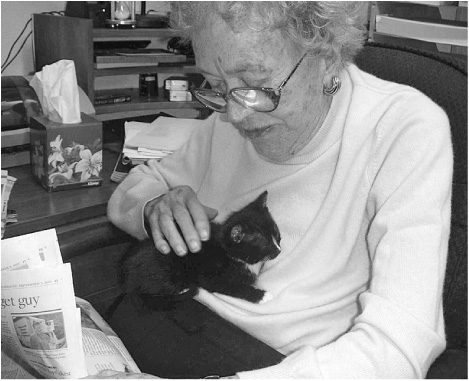
Her maison was still sans chat, and she wasn’t happy about it. Then, voilà! A friend showed up one day with a special delivery: a tiny black-and-white kitten with a wild look in its eye. Something about this little imp beguiled Julia. It nipped at her heels, crashed into her walker, snagged her sweaters, and gave too many little love bites. Julia called him—what else?—Minou. Whether he would answer to that, or at all, was another story.
A teensy thing with supersized curiosity, Minou soon wiggled his way into every cupboard, closet, and corner. Often, after searching under bedcovers and piles of papers, she might find him curled in a coffee cup or soup bowl. Minou chased butterflies, and his tail, in the small enclosed patio, but was soon scaling the wall to see what lay beyond, though he always came home when dinner was served.
For the mischief-loving Julia, it added to the fun that the kitten was a forbidden pleasure. Pets were banished from the upscale Montecito complex, but Julia blithely dismissed the rules and insisted, “My cat’s not going to bother anybody.” Even in so-called retirement she was the most interesting thing to happen around there in years, with or without her little outlaw.
Julia had underestimated her kitten’s spunk. He specialized in surprise attacks, waiting in the bushes for Julia’s neighbors to wheel their walkers deliberately past the house, in hopes of spotting the famous resident. Mighty Minou would stalk, crouch, and launch like a heat-seeking missile toward his hapless victim. Startled cries and meows brought the housekeeper rushing to the rescue, with Julia trailing behind. Captivated by the familiar fluty voice, the neighbor happily accepted an apology—“So sorry, dearie!”—and an invitation to meet in the dining room for breakfast with Julia, sans pussycat.
When Minou tired of his game of “gotcha” with the slow-moving prey, he’d come inside and nestle against Julia’s chest while she read the local paper. Occasionally he’d halfheartedly reach up to scratch the page or paw at her bifocals, but usually settled into a sleepy purring ball. He soon timed his naps to coincide with hers and claimed a spot on the pillow beside her head. Day and night, Julia and her poussiequette were inseparable.